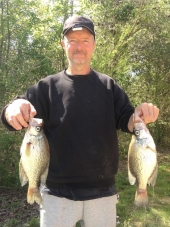




Thom Illingworth
Greensboro, NC USA
 1
1




 2
2




"You must be the change you want to see in the world." "First they ignore you, then they laugh at you, then they fight you, then you win." --Mahatma Gandhi
"Preach the Gospel always, and if necessary, use words." --Francis of Assisi.
"Family farms work when the whole family works the farm." -- Adam Klaus








Xisca - pics! Dry subtropical Mediterranean - My project
However loud I tell it, this is never a truth, only my experience...
 1
1




Thom Illingworth
Greensboro, NC USA
 1
1




"Turn your face to the sun and the shadows fall behind you." ~Maori Proverb
www.permi-eden.com
 6
6








Kevin EarthSoul (real, legal name)
Omaha, NE




Living in Anjou , France,
For the many not for the few
http://www.permies.com/t/80/31583/projects/Permie-Pennies-France#330873
 2
2




David Livingston wrote:KevIn
I think you may have shown some of the issues in your post. I am unclear what much you have said has to do with Permiculture as defined by any of the founders or as taught in a PDC
Could you care to elaborate?
David
Kevin EarthSoul (real, legal name)
Omaha, NE




"Turn your face to the sun and the shadows fall behind you." ~Maori Proverb
www.permi-eden.com
 1
1




Kevin EarthSoul (real, legal name)
Omaha, NE




"Turn your face to the sun and the shadows fall behind you." ~Maori Proverb
www.permi-eden.com




Jen Shrock wrote:Kevin - I do appreciate your explanation and perspective and, I must admit, it had me "squinting" a bit to try to wrap my head around it. I think one point that I didn't initially make is that, I think that all permaculture events should be clear what is being offered or experienced at the event so that people have an opportunity to evaluate what is the appropriate event for them. Permaculture comes in all different flavors or colors, allowing it to be what each person needs it to be for themself. As long as events are transparent in advance as to what people should expect while attending, I think that the rightpeople will end up in the right place, growing each part of the permaculture community and perspective while maintaining appropriate respect and appreciation of the other perspectives. If you put the wrong people in the wrong event, it will very likely give them a negative association which they will project on the entire set of principles.
I do think, though, that we have gotten off track of the original question and intent of this thread. Everything you have written has been interesting to consider andmight serve better actually being posted in it's own thread to generate more active particiapation and discussion. Maybe you want to consider starting another thread focused more directly on what you have presented in this one?
Kevin EarthSoul (real, legal name)
Omaha, NE
 1
1




Kevin EarthSoul wrote:When it comes right down to it, why can't Permaculture be broadly defined? .... please don't presume to point a finger at those who do, and proclaim "That's not Permaculture!"




 2
2








Dale Hodgins wrote:There's a guy on YouTube who promotes wood chip gardening. It's called Back to Eden something. It's hard to pay attention to a guy who so blatantly pumps his religion while leading a tour. He claims to ask god questions and receive answers. "So, I asked god ... and god told me ..." "You see how god makes everything work in harmony", "We've been here now for 6,000 years of recorded history". It went on and on and on. This did not instill confidence. It made me question and doubt, since I'm still not sure what is being promoted more. It would have been over the top even if he was showing the garden to a Sunday school class.
I'm quite interested in his growing methods but not keen to hear that he talks to spirits and hears voices.
Kevin EarthSoul (real, legal name)
Omaha, NE
 1
1




Permakultur i Norge: www.permakulturdesign.no




http://kitchengardens.net
http://agrari.us
http://claddaghfarms.com




Sometimes the answer is nothing

 1
1




wayne fajkus wrote: But it does have its downsides. I've got two issues I simply can't wrap my head around.
http://kitchengardens.net
http://agrari.us
http://claddaghfarms.com




Eivind Bjoerkavaag wrote:Yo, Zach! Could you please say some more about the purpleness on the Detroit event? It must have been more than some hippies howling at the moon.
Neal Foley wrote:myself and farmers like me, who have a chance to do great things within the permaculture framework will probably not ever call our work Permaculture
 1
1




Neal Foley wrote:
Well?? Don't leave us hanging..... What are the issues?? If you've started other threads....point to them here and we'll join the discussion there....
Sometimes the answer is nothing

 1
1








Living in Anjou , France,
For the many not for the few
http://www.permies.com/t/80/31583/projects/Permie-Pennies-France#330873
 2
2




http://kitchengardens.net
http://agrari.us
http://claddaghfarms.com




Zach Weiss wrote: The purple permaculture that Sepp saw in Detroit was more along the lines of hand holding and dancing around howling, pretending to be wolves. These kinds of activities Sepp does not feel comfortable participating in, and does not want his to be associated with.
WIN/WIN REACTOR
*** detroit's urban permaculture resource center ***
SURPLUS PERMACULTURE DESIGN
*** consultation, design, implementation ***

| I agree. Here's the link: http://stoves2.com |





